Got a small garden that’s feeling a bit overrun by pests? Don’t worry! Start by identifying those little invaders, like pesky aphids or sneaky caterpillars. Next, whip up a minty spray using peppermint oil and water—your plants will smell delightful! If things get tough, consider using systemic insecticides, but remember to play nice with nature. And don’t forget to invite beneficial insects to your garden party! Keep on exploring, and you’ll uncover even more tricks to keep your garden buzzing with life!
Understanding Common Garden Pests
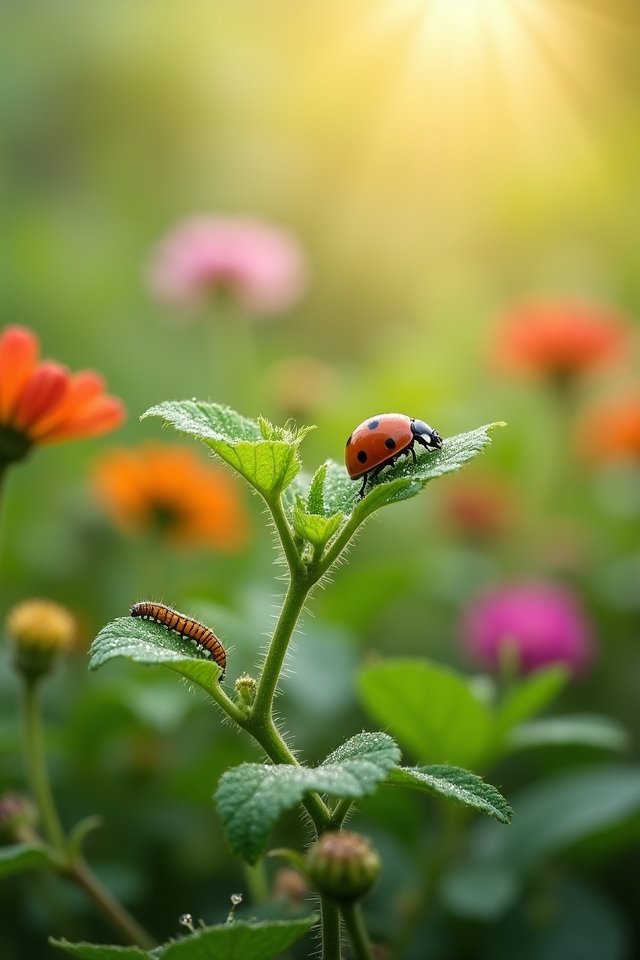
Understanding common garden pests is essential for keeping your plants thriving, especially if you want your little patch of paradise to flourish! You can’t defend your leafy friends without mastering pest identification techniques. Think of it as becoming a detective; you’d want to know who the villains are! Comprehending pest life cycles can help you anticipate those sneaky invaders. For example, if you spot tiny white flies, you might be dealing with aphids, and knowing they thrive in warm climates can let you spring into action! Don’t let your garden become their buffet! Tap into your inner scientist, observe your plants closely, and before you know it, you’ll be the proud protector of your vibrant, green oasis. Ready to conquer those critters?
Natural Pest Control Methods
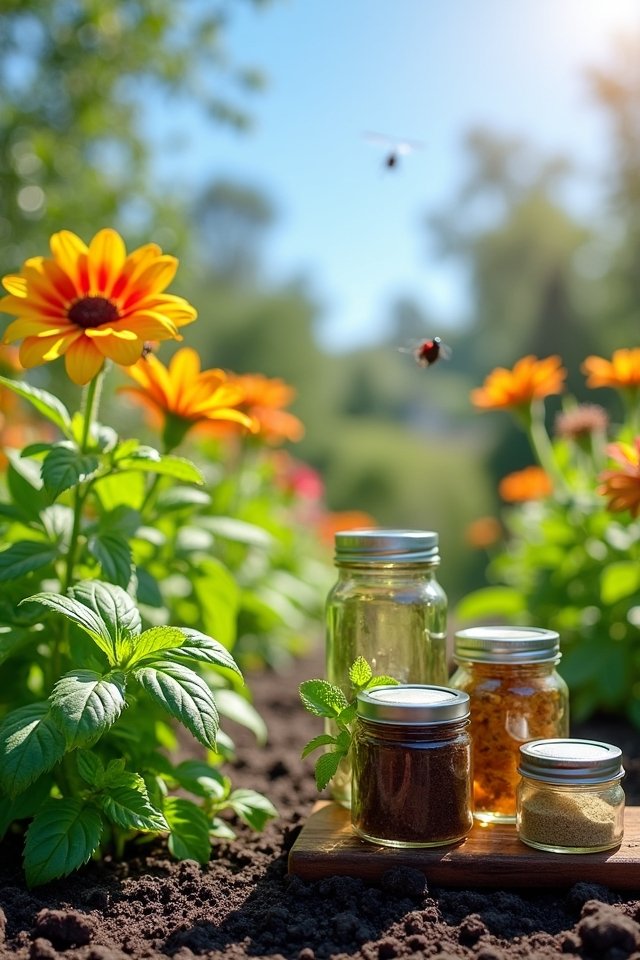
When pests invade your garden, don’t fret! Instead, welcome the power of nature with herbal repellents and essential oils. Imagine a fragrant shield around your plants, keeping pesky critters at bay! You can mix up a spray using peppermint or eucalyptus oil, which smells delightful to you but repels unwanted guests. Simply combine a few drops with water in a spray bottle, and voilà!
For an added bonus, plant marigolds or basil among your veggies—they naturally deter aphids and other pests like a superhero protecting your garden! Keep experimenting and find what works for you. So, don’t just sit back—take back your garden and turn it into a natural fortress of beauty, where only the good bugs are welcome!
Chemical Pest Control Options
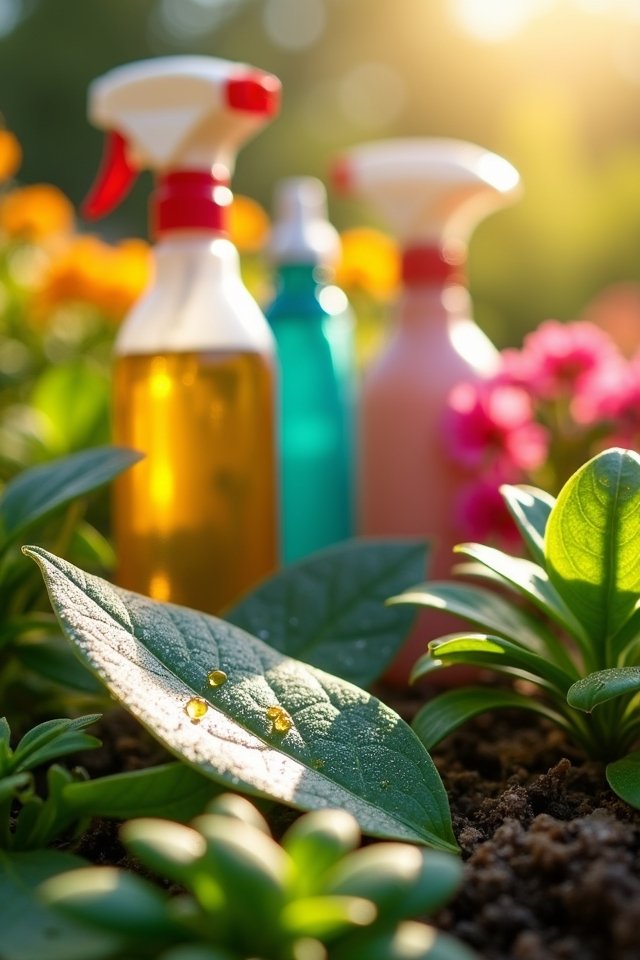
Sometimes, natural methods just don’t cut it, and that’s when chemical pest control options come into play. Don’t you want your garden to thrive without pesky intruders snacking on your prized tomatoes? With innovative chemical formulations, you can target those annoying insects head-on! For example, systemic insecticides can travel through the plant’s system, protecting it from root to leaf. Just imagine applying a fine mist with a sprayer—those bugs will be history! Consider application techniques like spot treatments for stubborn infestations or even fogging for those stealthy pests hiding in your shrubs. Remember, balance is key! You can wield these powerful tools with great responsibility, ensuring your garden stays vibrant and pest-free, while keeping the environment in mind. Happy gardening!
Integrated Pest Management Strategies
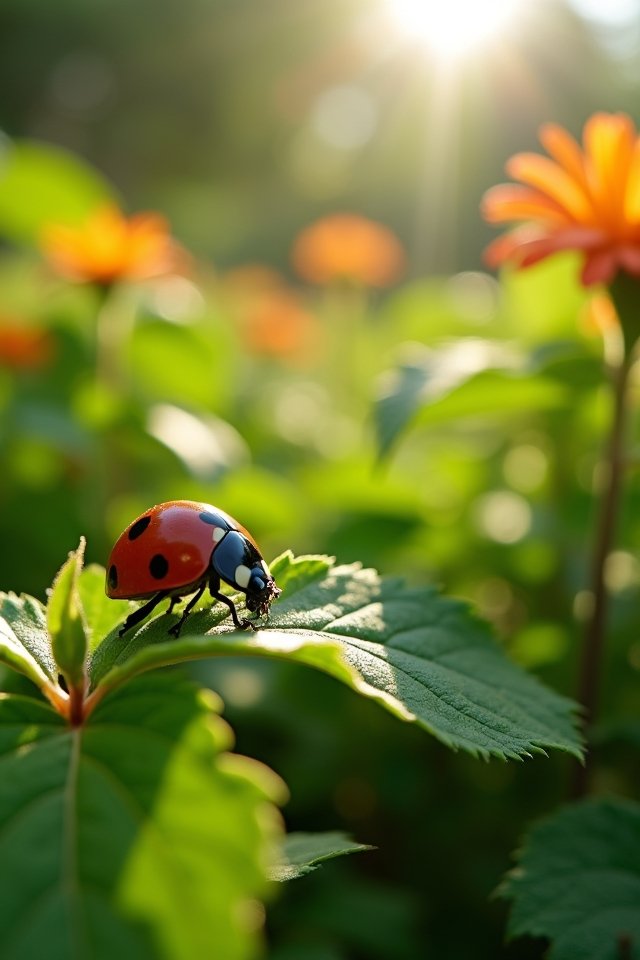
You might not realize it, but incorporating Integrated Pest Management (IPM) strategies could be the secret weapon your garden needs! Imagine knowing exactly which pests are munching on your plants. Pest identification is essential—you can’t fight what you can’t see! Start with cultural practices like crop rotation and selecting pest-resistant varieties. These are your garden’s natural bodyguards!
Attracting Beneficial Insects
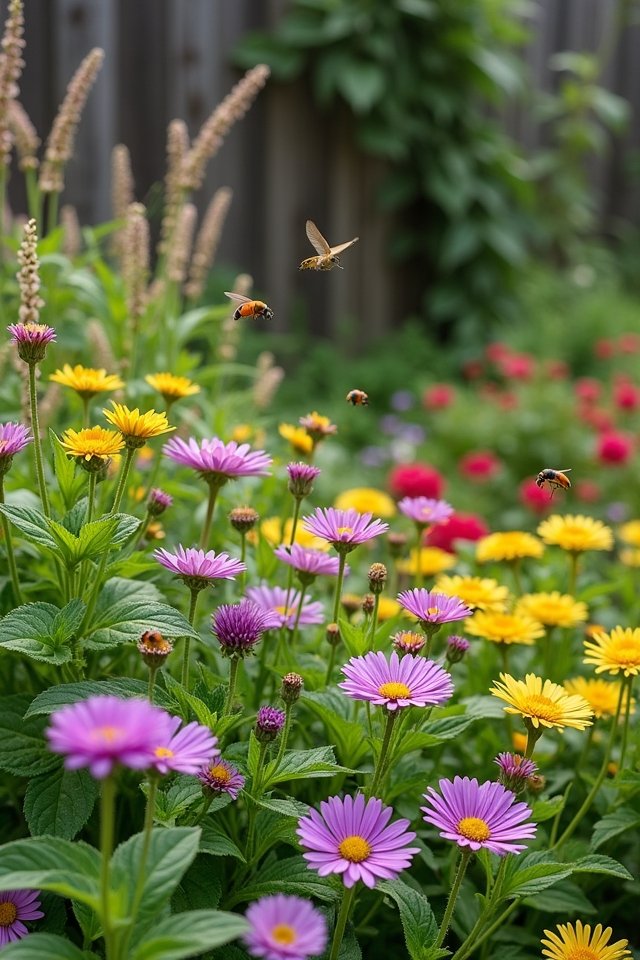
While pest control often focuses on getting rid of unwanted nuisances, attracting beneficial insects can feel like inviting nature’s superheroes into your small garden! Who wouldn’t want those little heroes buzzing around, ensuring a natural balance? Here are some innovative tips to create effective insect habitats:
- Plant diverse flowers like daisies and sunflowers to lure in pollinators.
- Provide nesting sites with twigs and leaves—it’s like offering a hotel for ladybugs!
- Avoid pesticides; instead, use organic methods. Think of it as a grand feast for your heroes!
- Create water sources using shallow dishes filled with stones—perfect for thirsty bees!
With these strategies, you’ll not only have a vibrant pollinator garden, but you’ll also enjoy nature’s delicate artistry up close! Isn’t that spectacular?
Crop Rotation and Companion Planting
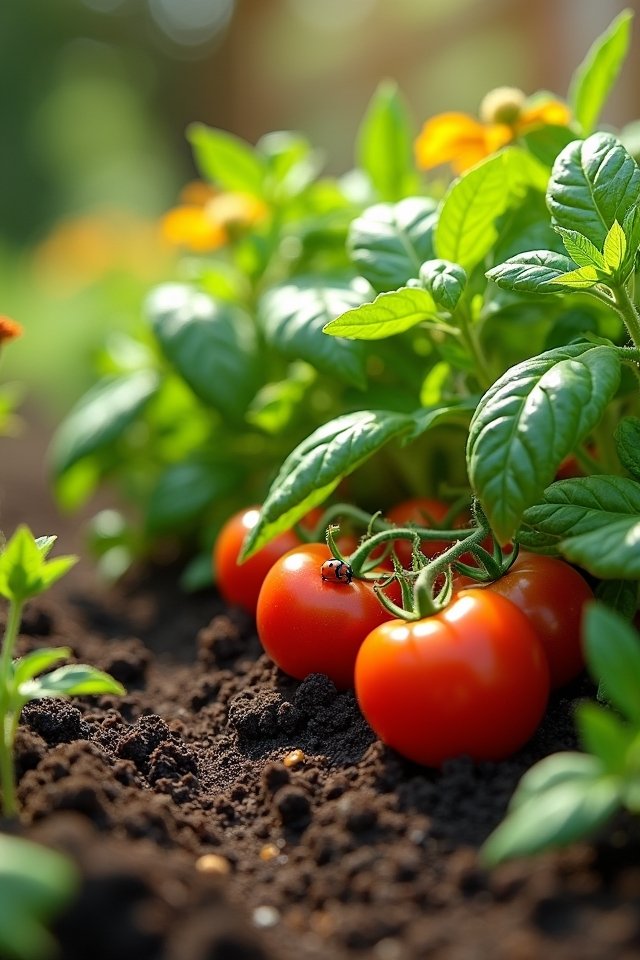
Attracting beneficial insects is just one piece of the puzzle for a thriving small garden. Have you thought about crop rotation and companion planting? These innovative techniques can both spice up your garden’s vibe and outsmart pesky pests! By rotating your crops, you give soil nutrients a chance to replenish, while disrupting pest life cycles. Imagine planting tomatoes one year, then following up with carrots—pests won’t know what hit them! Companion planting adds an exciting twist, too. Think basil hugging your tomatoes—it repels flies while enhancing flavor. Or how about marigolds mingling with your veggies? They attract pollinators and confuse critters! So, mix it up, and watch your garden flourish—your plants (and taste buds) will thank you!
Creating Physical Barriers
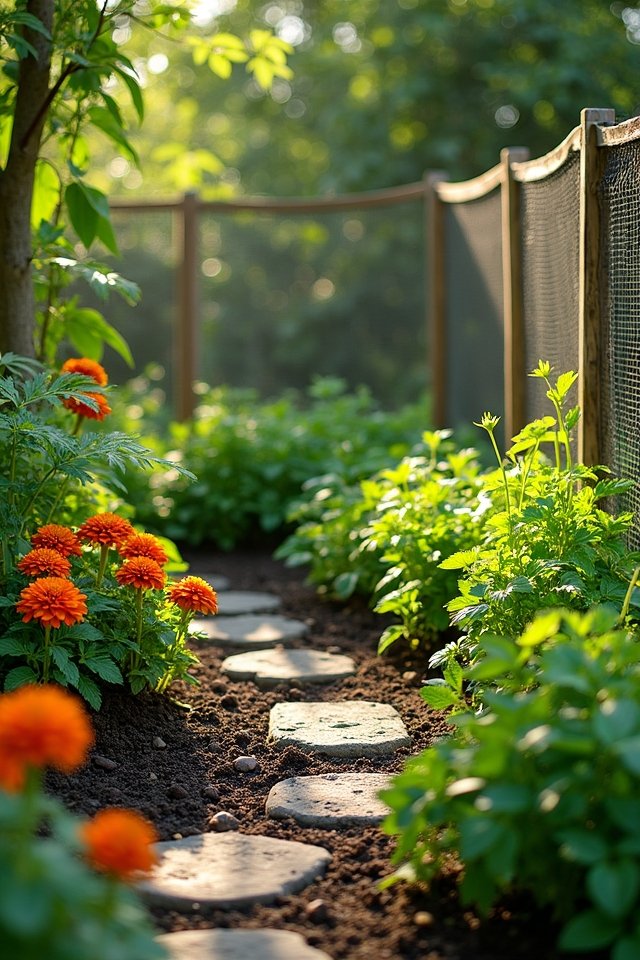
Physical barriers can be a gardener’s best friend! Why let pests munch on your hard work when you can build a fortress? Here are some innovative strategies for creating effective barriers:
- Fence Installation: A solid fence can deter larger pests. Make sure it’s buried a foot underground to stop diggers!
- Netting Options: Floating row covers protect delicate seedlings from insect foes. They let sunlight in but pesky pests out!
- Physical Traps: Think sticky traps for flying insects—just set ‘em, and watch the drama unfold!
- Raised Beds: Elevate your plants; not only does it improve drainage, but it also puts a little distance between them and ground-dwelling nuisances.
Regular Maintenance and Monitoring
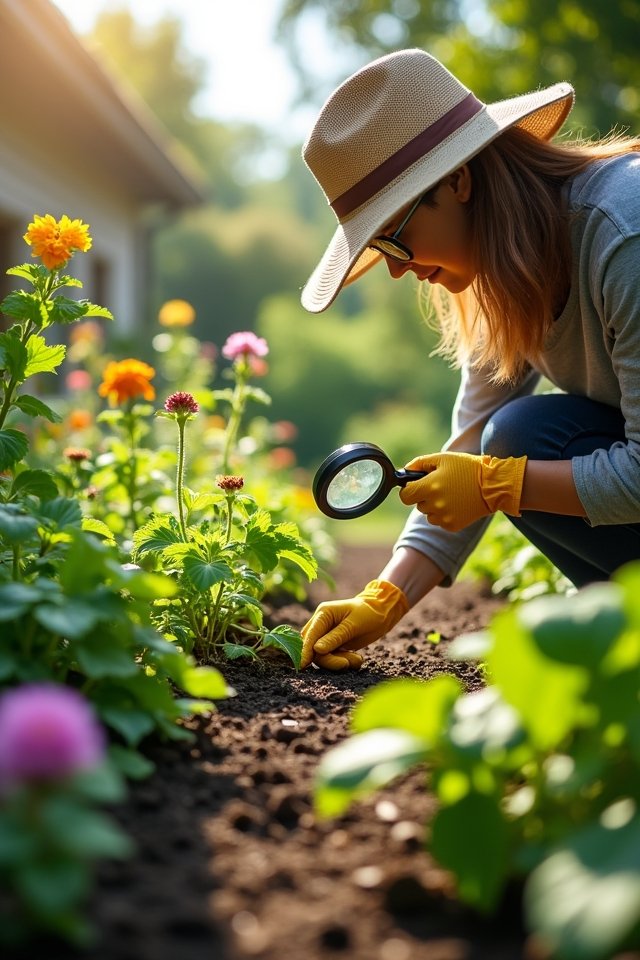
Keeping an eye on your garden can feel like being a devoted detective, always on the lookout for clues that pests might be creeping in! Start by using effective pest identification techniques, like checking leaves for munch marks or scouting for creepy-crawlies hiding beneath plant stems. You can catch problems early with regular check-ups! Seasonal maintenance tips, such as clearing debris or rotating crops, keep your garden healthy and pest-proof. Imagine pulling weeds while snacking on fresh strawberries—now that’s multitasking! Don’t forget to jot down your findings in a little garden journal—it makes you feel like an esteemed scientist! So, grab your magnifying glass, channel your inner sleuth, and explore the vibrant world of your little green paradise!
Organic Pest Control Products to Consider
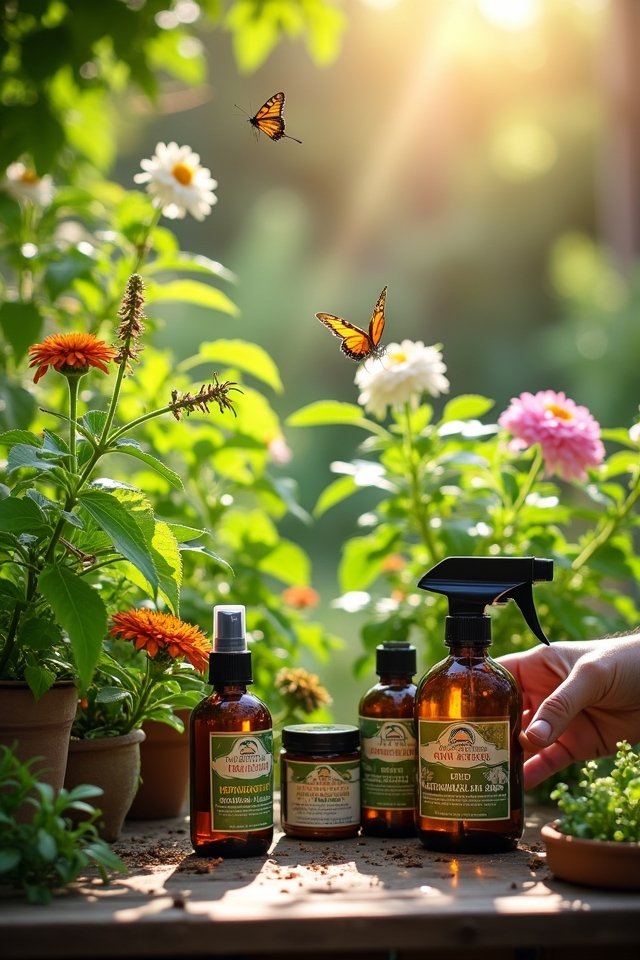
When it comes to keeping your small garden healthy and vibrant, you might want to explore some organic pest control products that are not only effective but also friendly to your plants and the planet. Here are some innovative options that’ll make your garden sing:
- Neem Oil: A natural insect repellent, it disrupts pests’ life cycles without harming beneficial insects.
- Garlic Spray: Its pungent aroma sends pests packing but won’t offend your flowers!
- Essential Oils: Like peppermint and lavender, they deter bugs with their fragrant charm.
- Herbal Remedies: Infusions of chamomile or thyme can strengthen your plants while warding off intruders.
Using these organic tools, you’ll let nature do the heavy lifting while you enjoy a thriving garden paradise!
Frequently Asked Questions
How Do I Identify Specific Pest Infestations in My Garden?
Identifying specific pest infestations in your garden’s like playing detective! Start with pest identification techniques—check for chewing leaves, sticky residue, or visible bugs. You might spot aphids, those tiny green munchers, or caterpillars, sneaky little ninjas! Use a magnifying glass to examine plants closely. Are they drooping? Yellowing? Or covered in tiny webs? If so, you’ve got a pest party crashing your garden! Immerse yourself with enthusiasm; your plants deserve the best!
What Time of Year Is Best for Pest Control Efforts?
The best time for pest control efforts is spring! That’s when you kick off your garden’s vibrant growth, and those pesky critters are just waking up, too. You should focus on spring treatments to nip infestations in the bud. Fall preparations are equally important—think of it as tucking your garden in for a cozy winter sleep. By preparing in the fall, you set the stage for a pest-free awakening come spring! How’s that for a plan?
Can Pets Be Affected by Garden Pest Control Methods?
When using pest control methods, keep your pets’ safety in mind. Those adorable furballs don’t need to be exposed to harsh chemicals! Instead, you can explore natural remedies like diatomaceous earth or essential oils. Imagine your garden buzzing with life, not bugs, while your pets frolic around carefree! Always check product labels and allow treatments to dry before letting your pets back outside. Your garden—and furry friends—will thank you!
How Do Weather Conditions Impact Pest Activity?
Weather conditions shape pest activity like a maestro conducts an orchestra! When it’s warm and rainy, pests thrive and multiply, while chilly, dry days send them hiding. You’ll notice that seasonal patterns directly impact which critters invade your space. For instance, summer showers might release an army of mosquitoes, while autumn’s crisp air encourages spiders to build cozy webs. So, keep an eye on the climate influence – it’s nature’s rhythm making your garden its stage!
Are There Any Pest Control Methods Safe for Edible Plants?
You can use natural insecticides like neem oil, which suffocates pesky bugs without harming your edible plants. How about organic repellents, like garlic spray? It’s like a superhero cape for your veggies—strong yet safe! Just mix garlic with water, and you’ve got yourself a potent potion! Remember, pest control doesn’t have to be scary; it can be innovative and fun! Your garden deserves protection, and both you and your plants will be grateful!


